Project History Book Launch: Considering the Young Generation in Nikkei Communities in Paraguay and the Country’s Development
2022.11.04
On July 27, 2022, the JICA Ogata Sadako Research Institute for Peace and Development (the JICA Ogata Research Institute) held an online seminar to commemorate the publication of “Los Inmigrantes Japoneses y su Contribución al Desarrollo del Paraguay - Contribución al Posicionamiento del País como el Cuarto Mayor Exportador de Soja en el Mundo y Nuevas Iniciativas para la Diversificación Industrial” (Translates to “The Contribution of Japanese Immigrants to Paraguay’s Development: Making the Country the World’s Fourth Soybean Exporter and New Efforts Toward Industrial Diversification”), a Spanish-language version in the Project History series published in July 2022.
Opening remarks were given by three participants. In his statement, Fukui Yasushi, chief representative of JICA Paraguay Office, reflected on the book’s theme of Paraguay’s path to accomplishing a transformation from soybean importer to exporter, as well as the cooperation of Nikkei communities (i.e., communities with descendants of those who emigrated from Japan to Paraguay) and Japan that contributed to that development for over 80 years.
Higaki Ryusuke, president of the Federation of Japanese Associations of Paraguay, stated, “Since reading Japanese is not at all easy for second-generation Nikkei Paraguayans, the publication of the Spanish version will be beneficial to them. We’ve held symposiums targeted at young people in Nikkei communities, on topics like the communities’ contributions to Paraguay’s development and their future dreams. I hope they can learn a lot about the history of Nikkei communities from this book.”
Kubo Mamoru, president of the Central Cooperativa Nikkei Argícola, mentioned that the path taken by Japanese immigrants to reach today’s development has been extremely rocky. He then pointed out that, although the success of soybean production was the result of trial and error, it would not continue forever. He said, “Forging ahead with industrialization and diversification of produced crops is necessary for Paraguay’s further economic development. It’s a challenge for the young generation.”
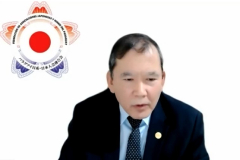
Higaki Ryusuke, president of the Federation of Japanese Associations of Paraguay
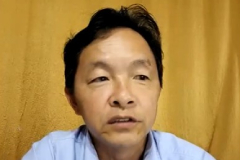
Kubo Mamoru, president of the Central Cooperativa Nikkei Argícola
Following an introduction to the book by its four authors, including Kitanaka Makoto, president of Sasakawa Africa Association, there was a talk session with Moriya Henry, president of the Paraguay Association for Nikkei Agricultural Engineers and director of A-Fines Consultora S.R.L., serving as moderator. In addition to the authors, three representatives of the young generation from Nikkei communities in Paraguay spoke at the session.
Ito Shinji, La Paz City Assembly member and officer of the La Paz Agricultural Cooperative, said that Japanese descendants initially adopted no-till farming and then developed environmentally friendly field crop farming in later years. The technology associated with the transition is accepted throughout the society, leading to the country’s development. Furthermore, he indicated that as competition in soybean production increases, the environment in which farmers operate has changed. For the further development of Paraguay and Nikkei communities, we need to search for ways to handle the problems faced and to harmonize not only Nikkei communities but also Paraguayan society as a whole.
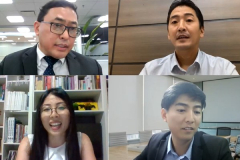
Representatives of the young generation from Nikkei communities in Paraguay spoke at a talk session
Kubota Rika, vice president of the Paraguay Association for Nikkei Agricultural Engineers, stated, “The book is a rich source for ideas about how Nikkei communities can continue contributing to Paraguay’s sustainable development.” After bringing up the expansion of cultivated land since 1945 and the decrease in forest area because of it, she also commented that behind the relatively gradual trend over the past several decades are the active contributions of the Nikkei communities, such as the introduction of environmentally friendly crop farming. “As Nikkei communities, we will give serious consideration to the balance between economic and societal development and environmental conservation and contribute by offering knowledge, technology and innovation.”
Yoshimura Masayuki, general manager of ZeDron E.A.S., described agricultural tools such as drones adopted by his company. He said these tools are used to monitor crop conditions, such as diseases and pests, and that there are many other potential uses. In addition, he touched on the importance of technological innovation in agriculture. “Now is an age of information and data, and it’s important to apply the information we have onsite and improve productivity per unit area. I personally find applying new technology very interesting in itself.”
Following presentations from the three young representatives from Nikkei communities, Moriya asked Hosono Akio, senior research advisor at the JICA Ogata Research Institute and one of the book’s authors, “What are other countries doing to motivate entrepreneurs and pioneers when they launch new industries or new businesses? Is it possible to adopt those things in Paraguay?” Hosono responded, “As Professor Joseph Stiglitz has also emphasized, people’s ability to learn is very important and will be the key to opening the door to innovation.” He suggested that when it comes to learning at work, Kaizen, a Japanese management methodology for enhancing quality and productivity, may also hold hints to innovation.
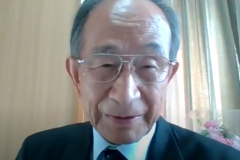
Hosono Akio, senior research advisor at the JICA Ogata Research Institute
Next, in response to the question on how to motivate the young generation in Nikkei communities to achieve comprehensive and sustainable development, Ito Keisuke, chief representative of JICA Bolivia Office, answered, “Breaking away from familiar and comfortable communities to set foot in a new world will stimulate them to create new ideas.” Hosono then also referred to the successful example of many Japanese descendants formerly joining the Cooperativa Colonias Unidas, an agricultural cooperative, creating good motivation through mutual learning.
Participants asked the authors several questions during the Q&A session. For example, Fujishiro Kazuo, deputy director general, Operations Support Department, JICA, replied to the question “It’s necessary to go beyond the boundaries of Nikkei communities to promote comprehensive development. How do you see this in the present and future?” He pointed out “Nikkei communities have been working to coexist with Paraguayan society up to now. As a result, they’ve already crossed social and economic boundaries. Looking toward the future, the young generation that is the next generation of Nikkei communities will need to deal with an international community that is becoming more globalized and complex.”
In the closing address, Raúl Florentín Antola, Paraguay’s ambassador to Japan, said, “There is no future without knowing history.” He pinned his hopes on the young generation in Nikkei communities, saying that they bring about important values, in addition to their contributions to Paraguay’s economic development.
Next, Nakane Suguru, director general, JICA Yokohama Center, introduced the Japanese Overseas Migration Museum, of which he is the director. The museum reopened after renovations in April 2022 to allow more people to learn about the history of Japanese emigration over the past 150 years, including their immigration in Paraguay.
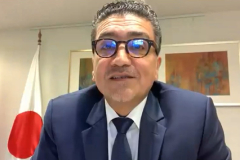
Raúl Florentín Antola, Paraguay’s ambassador to Japan
Finally, Ohara Manabu, director general, Latin America and the Caribbean Department, JICA, concluded by saying, “In today’s uncertain society, where infectious diseases and political instability are prevalent, it’s important for young people to take the initiative to create new ideas and play an active role. JICA will continue contributing to building stronger bonds of trust between Paraguay and Japan through the development of Nikkei communities.”
Seminario Conmemorativo “Los inmigrantes japoneses y su contribución al desarrollo del Paraguay”(Spanish only)

事業事前評価表(地球規模課題対応国際科学技術協力(SATREPS)).国際協力機構 地球環境部 . 防災第一チーム. 1.案件名.国 名: フィリピン共和国.

事業事前評価表(地球規模課題対応国際科学技術協力(SATREPS)).国際協力機構 地球環境部 . 防災第一チーム. 1.案件名.国 名: フィリピン共和国.

事業事前評価表(地球規模課題対応国際科学技術協力(SATREPS)).国際協力機構 地球環境部 . 防災第一チーム. 1.案件名.国 名: フィリピン共和国.

事業事前評価表(地球規模課題対応国際科学技術協力(SATREPS)).国際協力機構 地球環境部 . 防災第一チーム. 1.案件名.国 名: フィリピン共和国.

事業事前評価表(地球規模課題対応国際科学技術協力(SATREPS)).国際協力機構 地球環境部 . 防災第一チーム. 1.案件名.国 名: フィリピン共和国.
scroll